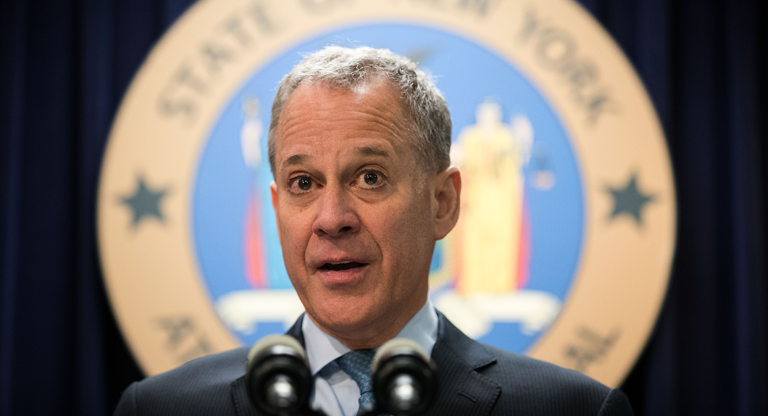New York state law must be clarified to ensure anyone pardoned by President Donald Trump may still be charged with violations of state law, state Attorney General Eric Schneiderman said on Wednesday.
Schneiderman, a Democrat who has emerged as a key figure in investigations related to Trump and his administration, urged state lawmakers to quickly eliminate a loophole in current state statute that he said could be used to fight state charges by anyone who has received a federal pardon for similar federal charges.
“Simply put, a defendant pardoned by the president for a serious federal crime could be freed from all accountability under federal and state criminal law, even though the president has no authority under the U.S. Constitution to pardon state crimes,” Schneiderman wrote in a letter sent to Albany lawmakers.
Schneiderman said he was “disturbed” by reports that Trump, a Republican, may be considering issuing pardons that could impede ongoing criminal investigations, potentially including those into the Trump Organization, the administration or Russian meddling in U.S. elections.
The loophole was identified in the state’s double jeopardy law, which protects people from repeat prosecutions for the same allegations. The law contains several exceptions, such as one allowing state prosecutors to bring charges when a court has nullified an earlier federal trial. But it does not include an exception specifically allowing a state prosecution when a president has issued a pardon for similar federal charges. Schneiderman said the Legislature “could not possibly have intended” to create the loophole, which he said must be closed “quickly.”
Lawmakers are in session in Albany and could take up Schneiderman’s proposed fix as soon as next week. The Democratic-controlled Assembly isn’t likely to object, but the state Senate is controlled by Republicans. A spokesman for the Senate’s GOP leaders did not respond to a message seeking comment Wednesday evening.
Democratic Sen. Todd Kaminsky, a former federal prosecutor, said he would introduce legislation to fix the problem.
“The writers of our state’s strict double jeopardy statute did not take into account the president’s pardon power and certainly did not contemplate the capricious use of that power to undermine the rule of law,” he said.
Trump last week issued a pardon to I. Lewis “Scooter” Libby, a former top aide to Vice President Dick Cheney, suggesting Libby had been “treated unfairly” by a special counsel. White House spokeswoman Sarah Huckabee Sanders insisted the pardon was not intended to send a message to the special counsel investigating Russian meddling in the 2016 election, saying, “One thing has nothing to do with the other.” But critics noted the timing, coming as Trump fumes over special counsel Robert Mueller’s probe, which Trump has dubbed a “witch hunt.”
A pardon is not a finding of innocence, but it does restore the civil rights that are normally lost because of a criminal conviction.
The Libby pardon was the third for Trump. He issued one last year to former Arizona sheriff Joe Arpaio, who was awaiting sentencing for contempt of court. He also pardoned a U.S. Navy sailor who was convicted of taking photos of classified portions of a submarine.
(AP)











One Response
However a state can only prosecute someone for crimes committed within that state. States are limited geographically. The reverse isn’t true. The Cuomo pardon for violation of state law always leaves open the option of a federal prosecution for the same act (assuming the act is criminal under federal law) since federal jurisdiction covers all states.